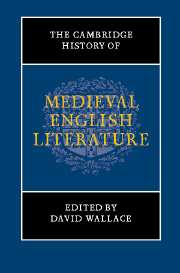Book contents
- Frontmatter
- I AFTER THE NORMAN CONQUEST
- II WRITING IN THE BRITISH ISLES
- III INSTITUTIONAL PRODUCTION
- IV AFTER THE BLACK DEATH
- Introduction
- 18 Alliterative poetry
- 19 Piers Plowman
- 20 The Middle English Mystics
- 21 Geoffrey Chaucer
- 22 John Gower
- 23 Middle English lives
- V BEFORE THE REFORMATION
- Chronological outline of historical events and texts in Britain, 1050–1550
- Bibliography
- Index of manuscripts
- Index
Introduction
from IV - AFTER THE BLACK DEATH
Published online by Cambridge University Press: 28 March 2008
- Frontmatter
- I AFTER THE NORMAN CONQUEST
- II WRITING IN THE BRITISH ISLES
- III INSTITUTIONAL PRODUCTION
- IV AFTER THE BLACK DEATH
- Introduction
- 18 Alliterative poetry
- 19 Piers Plowman
- 20 The Middle English Mystics
- 21 Geoffrey Chaucer
- 22 John Gower
- 23 Middle English lives
- V BEFORE THE REFORMATION
- Chronological outline of historical events and texts in Britain, 1050–1550
- Bibliography
- Index of manuscripts
- Index
Summary
This section considers the later fourteenth century, an intellectually rigorous and highly imaginative phase of literary composition. No simple correlation can be made between heterogeneous developments in writing and the catastrophic effects of plague (which killed perhaps one third of the European population between 1348 and 1350; lesser outbreaks occurred every decade or so thereafter). The long-term economic consequences of such a pandemic, like those of world wars, often prove paradoxical. Large-scale death of peasantry, for example, intensified demand for peasant labour. This generated greater social mobility, encouraging self-determination among workers and hence challenges to established monopolists of written cultures (chapter 16). Practices of Englishing (considered in association with the Bible in the previous section, and with Lollardy in the next) are of pre-eminent importance for all topics considered in this section: alliterative poetry, Langland, Middle English mystics, Chaucer, Gower, and Middle English lives.
Several of the chapters here take issue with the anticipated terms of their own conceptualization. Piers Plowman is read as a continuous process of composition rather than as three (or even four) canonical texts. Alliterative poetry is considered as a matter of heterogeneous survival (rather than localized revival), as one competing form of a national literature (at home in London as well as Cheshire), as a space of consciousness rather than of geography. The Langland of B-text may thus be seen as a London poet, while the Canterbury Tales (following Chaucer’s move to Kent) might be read as a view from the provinces. The writers clustered and canonized as ‘Middle English mystics’ since 1900 are let loose into the wider terrain of Middle English writing.
- Type
- Chapter
- Information
- The Cambridge History of Medieval English Literature , pp. 483 - 487Publisher: Cambridge University PressPrint publication year: 1999



